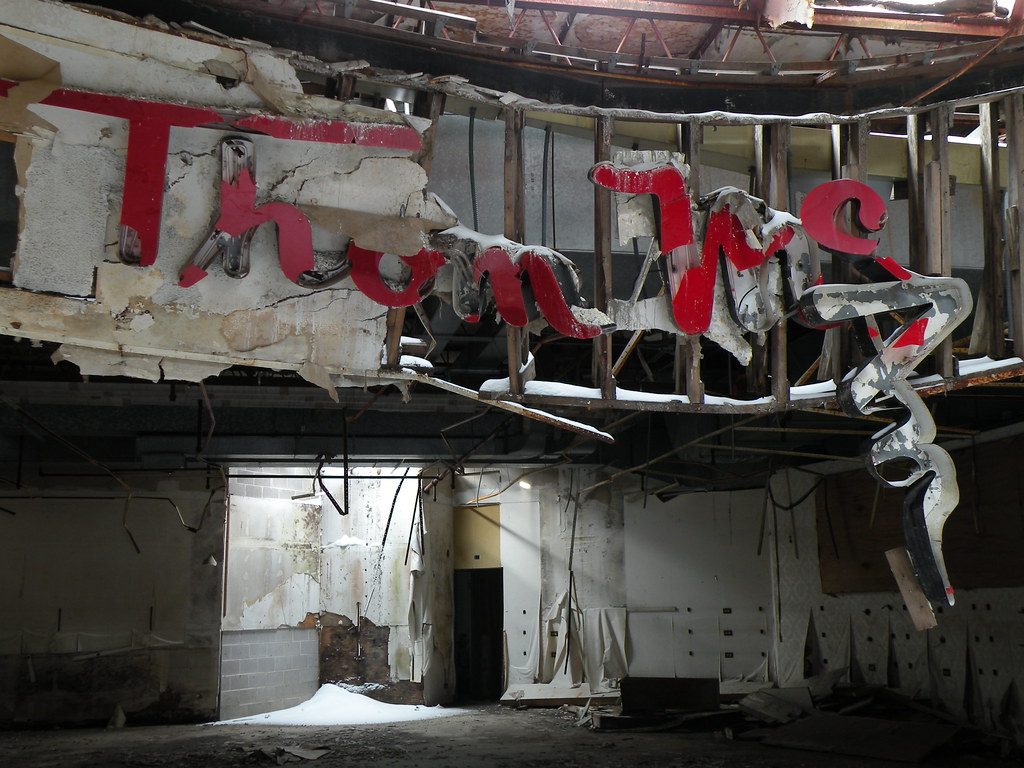
Thom McAn Shoes located in Block D, Dixie Square Mall, Harvey, Illinois. photo by Mike Brown (Mickey B Photography), 27 January 2008
The subject of this book is an illusion expressed by Schopenhauer in the following formula: to seize the essence of history, it suffices to compare Herodotus and the morning newspaper. What is expressed here is a feeling of vertigo characteristic of the nineteenth century's conception of history. It corresponds to a viewpoint according to which the course of the world is an endless series of facts congealed in the form of things. The characteristic residue of this conception is what has been called the "History of Civilization," which makes an inventory, point by point, of humanity's life forms and creations. The riches thus amassed in the aerarium of civilization henceforth appear as though identified for all time. This conception of history minimizes the fact that such riches owe not only their existence but their transmission to a constant effort of of society -- an effort, moreover, by which these riches are strangely altered. Our investigation proposes to show how, as a consequence of this reifying representation of civilization, the new forms of behavior and the new economically and technologically based creations that we owe to the nineteenth century enter the universe of a phantasmagoria. These creations undergo this "illumination" not only in a theoretical manner, by an ideological transposition, but also in the immediacy of their perceptible presence. They are manifest as phantasmagorias.
Walter Benjamin: from Paris, Capital of the Nineteenth Century: Exposé (1939), translated by Kevin McLaughlin, in The Arcades Project (Das Passagen-Werk), ed. Rolf Tiedemann, 1999
The
innermost glowing cells of the city of light, the old diorama, nested
in the arcades, one of which still bears the name Passage des Panoramas.
It was, in the first moment, as though you had entered an aquarium.
Along the wall of the great darkened hall, broken at intervals by narrow
joints, it stretched like a ribbon of illuminated water behind glass.
The play of colors among the deep-sea fauna cannot be more fiery. But
what came to light were open-air, atmospheric wonders. Seraglios were
painted on moonlit waters: bright nights in deserted parks loomed large.
Walter Benjamin: from Panorama, translated by Howard Eiland, in The Arcades Project (Das Passagen-Werk), ed. Rolf Tiedemann, 1999

Thom McAn sign, Dixie Square: photo by jonrev, 11 January 2009

Thom McAn and Block D, Dixie Square Mall: photo by jonrev, 11 January 2009

Today it's Thom McAn. Looking out from Thom McAn towards TurnStyle: photo by jonrev, 11 January 2009

Thomas Has Left the Building: photo by jonrev, 11 January 2009

Thom McAn and Block D, Dixie Square Mall: photo by jonrev, 11 January 2009

Today it's Thom McAn. Looking out from Thom McAn towards TurnStyle: photo by jonrev, 11 January 2009

Thomas Has Left the Building: photo by jonrev, 11 January 2009

DSM TM. [Restored original Thom McAn sign from demolished Dixie Square Mall.]. Neon pending, the "T" is original to its installation in Block D: photo by jonrev, 30 August 2012
Tom,
ReplyDelete"the world is an endless series of facts congealed in the form of things"
7.14
grey whiteness of fog against invisible
ridge, circular orange flowers on rocks
in foreground, sound of wave in channel
color there in upper corner,
formation pertains to
“wrong” color, no more than,
that point where each
grey white of fog against top of ridge,
pair of egrets flapping toward horizon
America's own arcades; these photos show a double desolation. Benjamin's challenge to "the inventory", the false steady picture, is needed even more. Ours is a phantasmagoric age before anything else.
ReplyDeleteMEP
ReplyDeleteTom! Get with the program!
The major revolution in the last decade is the recognition of the "law of maximum entropy production" or "MEP" and with it an expanded view of thermodynamics showing that the spontaneous production of order from disorder is the expected consequence of basic laws.
Why...why this explains everything!
Listen up! . . . it has been shown that the progressive attraction of matter away from equilibrium is governed by a law of maximum entropy production. Nonlinear relations between components puncture the space-time barriers to entropy production of the incoherent (linear) regime by extending the dissipative surfaces of the fields from which they emerge by orders of magnitude. Those attractors prevail that extend their dissipative surfaces at the fastest possible rate given the constraints. From the first prokaryotes on the Archean Earth to the increasingly accelerating cultural systems of today, evolution on planet Earth can be seen as an epistemic process by which the global system as a whole learns to degrade the cosmic gradient at the fastest possible rate given the constraints.
R. Swenson: from Emergent Evolution and the Global Attractor: The Evolutionary Epistemology of Entropy Production Maximization. Proceedings of the 33rd Annual Meeting of The International Society for the Systems Sciences, P. Leddington (ed)., 33(3), 46-53.
Therefore I order you to leave that disintegrating mall immediately, before you get hurt(er)
Chief Little Turtle, Acting Vice President, Schiff Shoes
“. . . to seize the essence of history, it suffices to compare Herodotus and the morning newspaper.” Yeah, baby! And to the Reifiers of History, who keep mucking around with the cosmic gradient, we say: “Put your hands where we can see them and back away from everything!”
ReplyDeleteTerrific post.
A good short history of Dixie Square Mall, post mortem (from American Urbex, 25 April 2012)
ReplyDeleteAs to Thom McAns...
"Ward Melville, chairman of the Melville Corporation, introduced the new Thom McAn shoe line in 1922, opening the first Thom McAn retail store in New York. The brand was named after Scottish golfer Thomas McCann. Within five years, 300 stores were open, and by 1939 there were over 650 stores.The brand achieved the peak of its popularity and near iconic status from the 1950s to the 1970s, due to its combination of quality leather and affordability. There were 850 Thom McAn stores in the United States in 1955, and Melville became the largest American shoe retailer by the 1970s, operating 1,400 stores."
The brand had became familiar and recognizable by the time of my childhood (1940s), when the terms "Thom McAns" and "shoes" had become virtually synonymous.
"Advertising becomes information when there is no longer anything to choose from, when the recognition of brand names has taken the place of choice, when at the same time the totality forces everyone who wishes to survive into consciously going along with the process. This is what happens under monopolistic mass culture. We can distinguish three stages in the developing domination of needs: advertising, information and command. As a form of omnipresent familiarization mass culture dissolves these stages into one another. The curiosity which it kindles brutally reproduces that of the child which already derives from compulsion, deception and renunciation. The child becomes curious when its parents refuse to provide it with genuine information. It is not that original desire to look with which ontologies ancient and modern have obscurely connected it, but a gaze narcissistically turned upon itself. The curiosity which transforms the world into objects is not objective: it is not concerned with what it knows but with the fact of knowing it, with having, with knowledge as a possession. This is precisely how objects of information are organized today. Their indifferent character predestines their being and they are incapable of transcending the abstract fact of possession through any immanent quality of their own. As facts they are arranged in such a way that they can be grasped as quickly and easily as possible. Wrenched from all context, they are made instantly accessible in an infantile grasp. They may never be broadened out in any way but like favourite dishes they must obey the rule of identity if they are not to be rejected as false or alien. They must always be accurate but never true."
Theodor Adorno: from The Schema of Mass Culture (Das Schema der Massenultur), translated by Nicholas Walker, in The Culture Industry, ed. J.M. Bernstein, 1991
The Thom McAn store was one of the early occupants at Dixie Square in the mid-1960s.
The growing popularity of sneakers in the 1980s took a large toll on Thom McAn sales.
"Melville Corp. began to focus on its sporting footwear division, Footaction USA. More than a third of Thom McAn outlets were closed during this decade."
By which time the Dixie Square Thom McAn outlet store was already returning to nature.
"The trend away from conservative leather casual shoes toward sneakers continued in the 1990s. In 1992, Melville closed 350 of the remaining 740 Thom McAn stores. In 1996, Melville converted 85 Thom McAn stores into Footaction outlets, and it closed the remaining 200 stores. Melville divested itself of all of its shoe retailing business, focusing on its CVS drug stores. A new corporation, Footstar, was created from the former Melville shoe lines."
Dixie Square, Block C, Summer 2004: not quite forty years into its existence at this location, twenty-five years after closure of the mall, and after many subsequent years of exposure to the elements, the Thom McAn sign has just now begun to sag....
Tom,
ReplyDelete"The child becomes curious when its parents refuse to provide it with genuine information"
I never had a pair of Thom McAns when I was growing up, perhaps I wasn't curious?
The ghost of Thom McAn passes over Asbury Park...
ReplyDeleteA glimpse of the future in the past.
ReplyDeleteAnd the future... is already getting old.
ReplyDelete